48 Hours To Back GOLD TEETH! And The Wyrd Science Of Interviews
Welcome, favoured adventure-folk, to the TEETH newsletter! This is a (mostly) weekly transmission about our explorations in the very secret land of Tabletop Roleplaying-Games.
We have published a series of our own TTRPGs and our latest book, GOLD TEETH, is on Kickstarter now!
What appears within this letter is written and compiled by veteran game critic and designer, Jim Rossignol, and former Mojang alumni and famed illustrator, Marsh Davies. Why not come and join us over on the TEETH Discord! Free tooth emojis for everyone!
And hey, if you can wish to support us and also get a fantastic 320-page RPG, you can BUY OUR ORIGINAL BOOK, if you aren’t already a member of that rather cool and highly exclusive club, that is…
Hello, you.
Links!
A Wyrd interview with John Power Jr.
Hello, you.
A mere 48 hours remain on the GOLD TEETH Kickstarter! This is going to be a fantastic book, and we’d love to have you all on board for a voyage into the horrible seas ahead.
You’ve probably already seen the campaign pitch, but we’re already getting on with wading into the deep, dark waters of producing the book, which of course means plumping it out with various the stretch goals, the latest of which was unlocked over the weekend.
Marsh has been working on pirate crews most recently, with a particular focus on their flags and captains. They’re a handsome bunch.
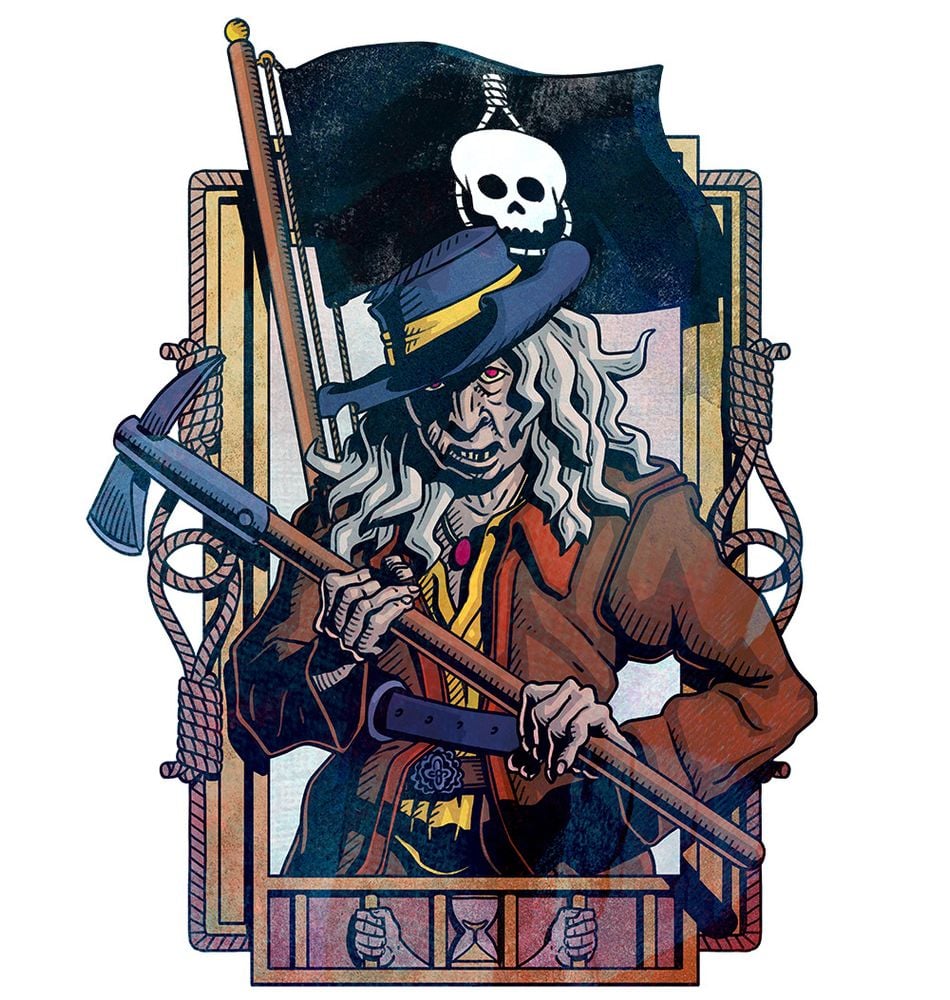
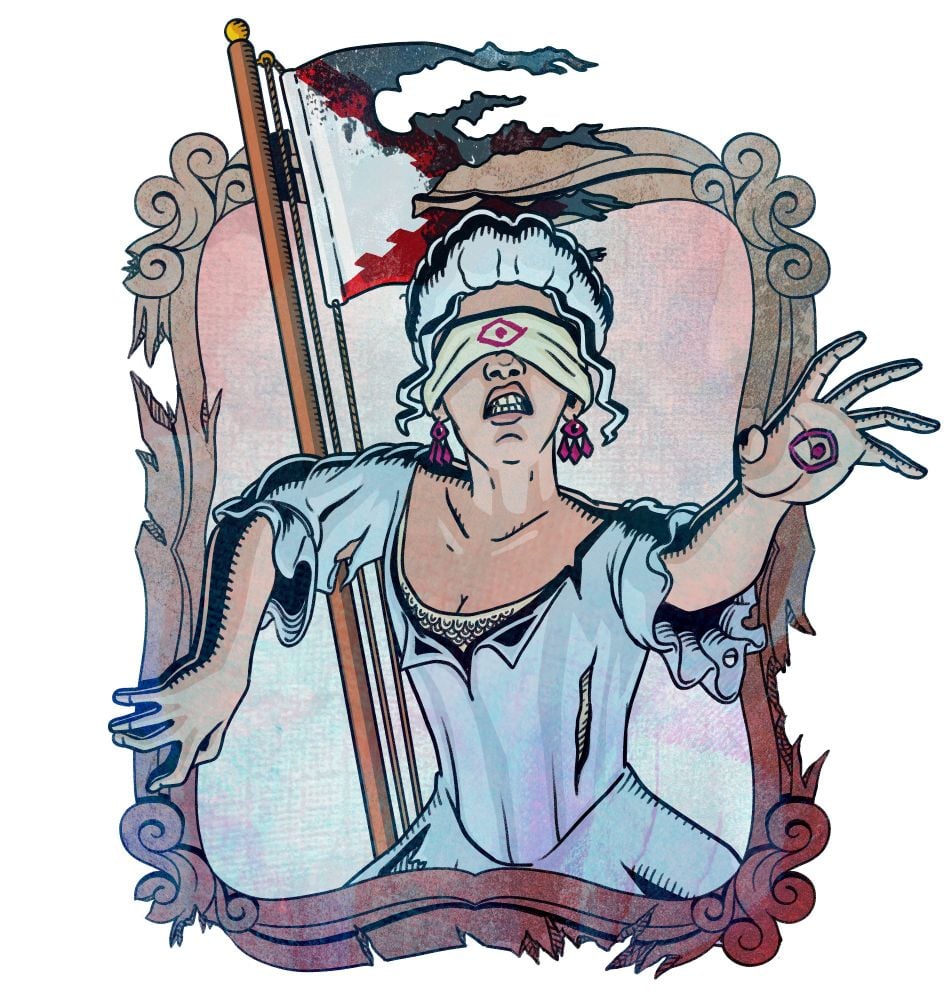
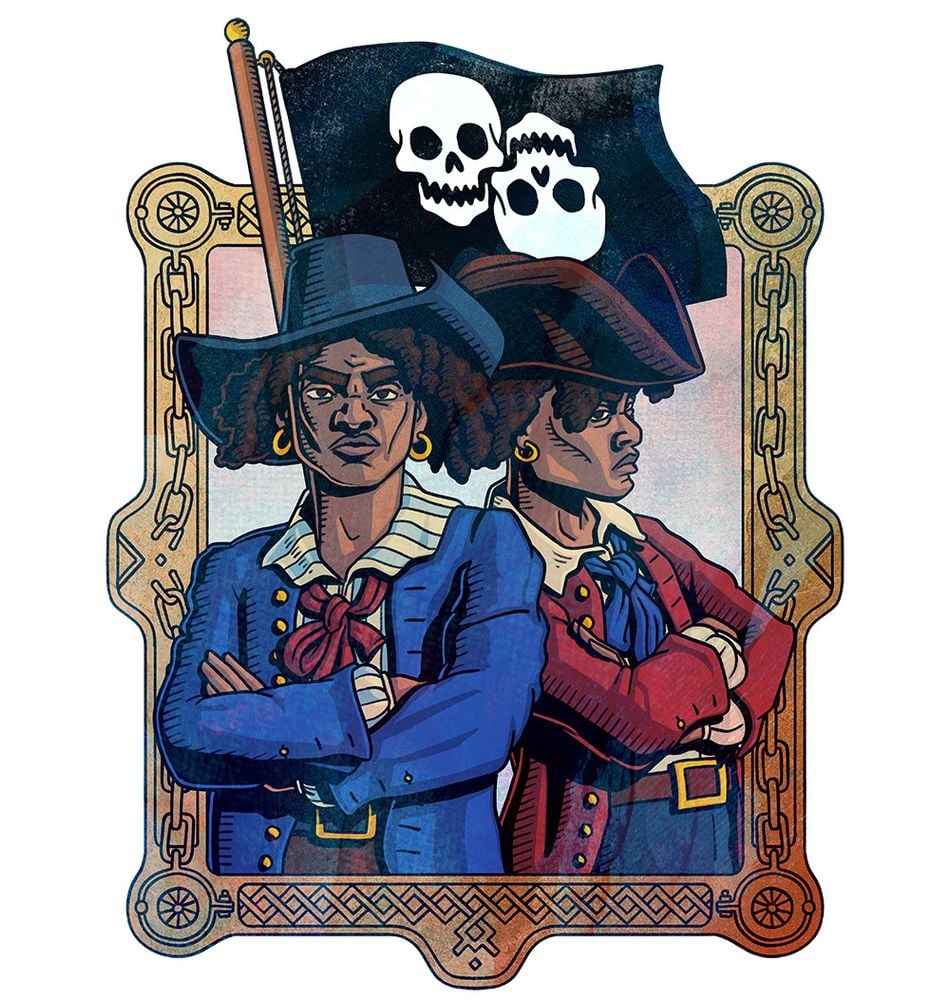
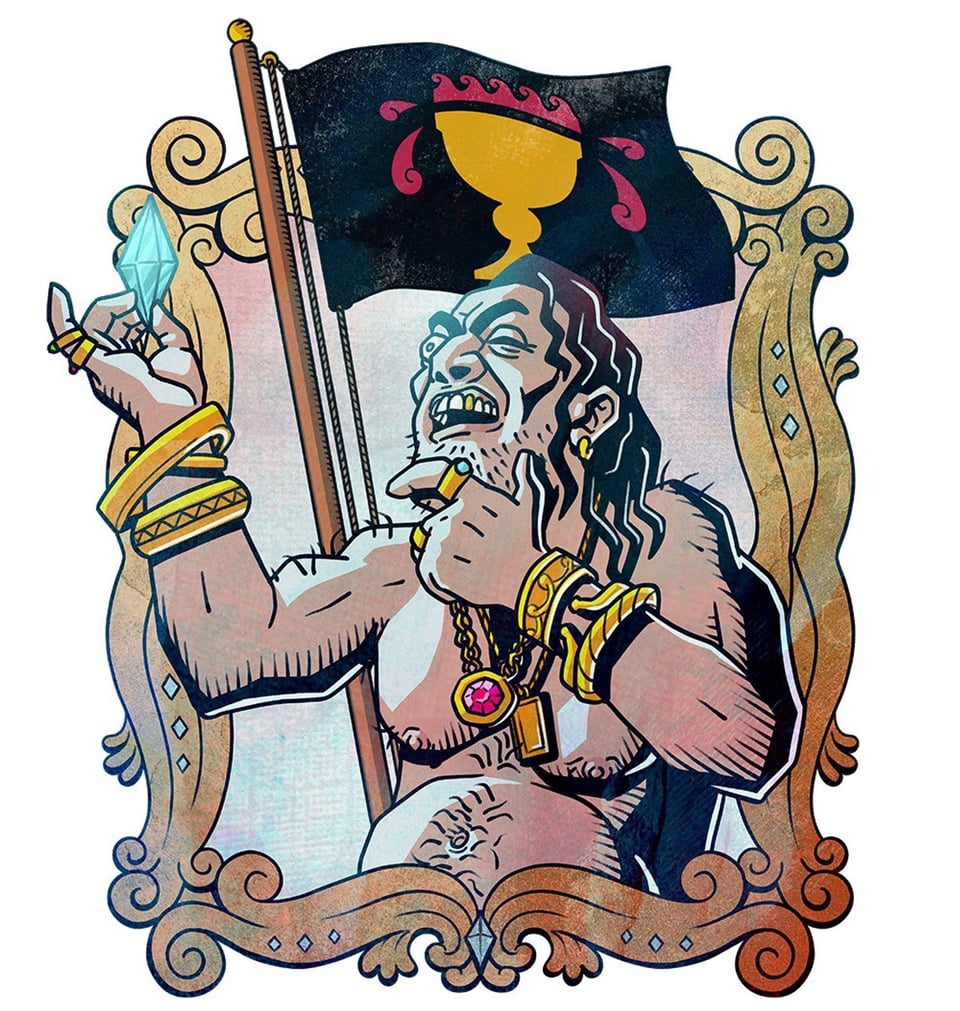
We’ll be posting more bits and pieces of the book as we go. There’s much more to come.
Love,
-Marsh & Jim
LINKS!
THING OF THE WEEK: Sometimes you need a little nudge to go back and check out something you were interested in, and that’s what has happened here thanks to TEETH community member Mendercap, who sent us their Ironsworn setting, Dwellers Under The High Grave. I’ve been meaning to run an Ironsworn game for a while now, after we checked out the sci-fi variant last year. This system’s prompt tables, or “oracles” are at the heart of making things work for the GMless (or even GM’d!) modes, and so it is here. Mendercap’s exquisitely produced 32-page setting set me back on that path. Additionally, the setting “takes place in the world of Ironsworn and draws inspiration from the history, folklore and landscapes of Ukraine”. It’s also (exquisitely) illustrated by the talented Roman Dubina. (I should mention that the Ironsworn rules are, against all reason, entirely free.)
Famous comic-book auteur Kieron Gillen is designing a clever wargame rule set.
Do consider the TTRPGs for Accessible Gaming Charity Bundle.
Research this week led us to Monte Ne. “Despite Harvey's efforts to publicize his resort and draw both visitors and businesses, Monte Ne was not a financial success. By 1920 the rail line had been sold and abandoned, and the Monte Ne Bank closed. Given these setbacks, and Harvey's belief that civilization was doomed, he began to focus his efforts on building "The Pyramid", a 130 foot tall obelisk that would eventually contain books and objects that reflected human life in the 20th century, preserving them for future generations to discover.”
A Wyrd interview with Wyrd Science’s John Power Jr.
It seems unlikely to have escaped your notice that we are big fans of tabletop gaming magazine Wyrd Science. It is both well written and superbly produced, and it’s our belief that the community is blessed to have seen such a publication. But what’s next? And how did this happen in the first place? We had to put some questions to its creator — DJ, longsword fighter, and band-manager, John Power Jr — who told one rather familiar story, and then taught us about treating Space Wizards and Gelatinous Cubes with the respect they deserve.
BUT ALSO: as an exclusive offer to newsletter readers you can order stuff via the Wyrd Science website with the code TEETH20 at checkout for 20% off! So why not treat yourself?
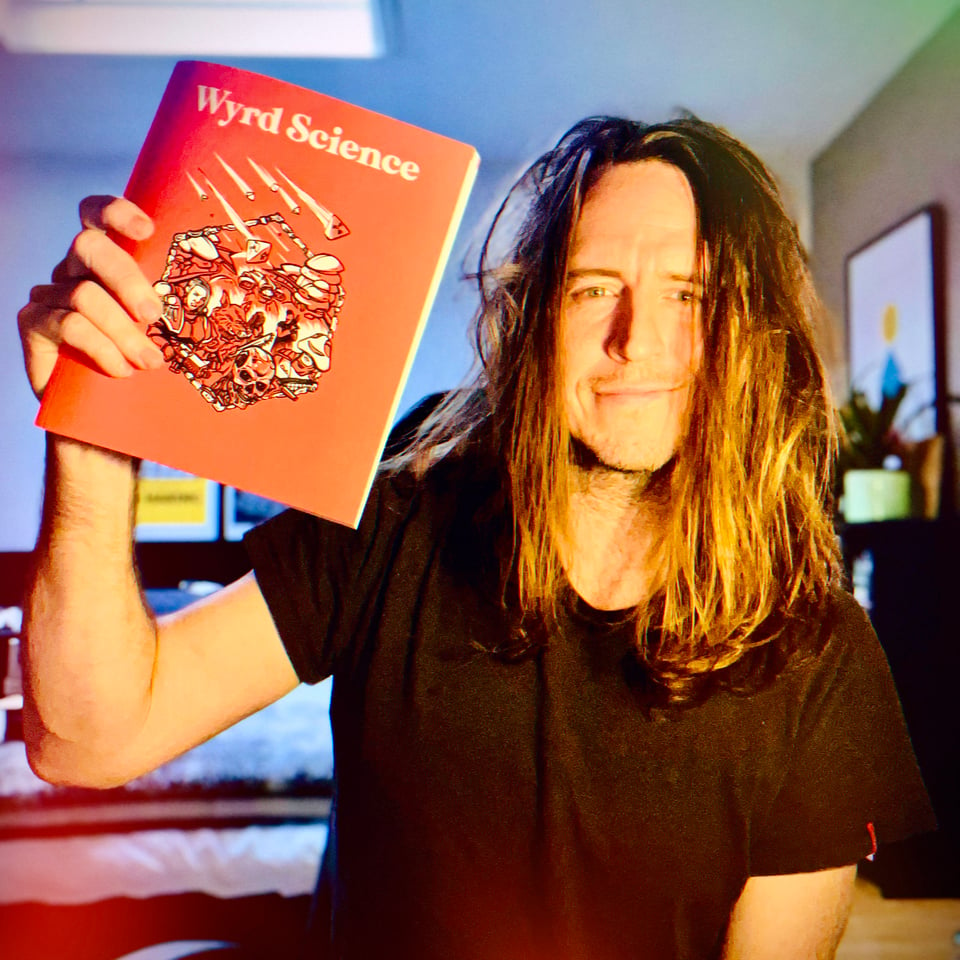
JR: Mr Power. Could you tell our readers a little about yourself? Not everyone ends up publishing a high-production values magazine of criticism and reporting on the tabletop scene, how did that end up being you? What were the big influences on your life that led here?
JP: Of course. So, basically, Wyrd Science was a combination of having nothing else to do and getting tired of waiting for someone else to do it. But we’ll get to that…
As for big influences, well I’m both British and in my forties so like a lot of people in that predicament you can lay the blame for most of this squarely at the feet of Ian Livingstone and Steve Jackson. I was about seven when Deathtrap Dungeon came out and that pretty much damned me upon this course. Saying that, I’d probably have stumbled into RPGs and the like at some point anyway. Growing up we played a lot of games and no windswept caravan holiday in Cornwall was complete without endless rounds of bingo, dominoes, cards, and Trivial Pursuit.
Most importantly though where I lived in the suburbs of London there were kids, roughly my age all around, and we were always playing something. If the weather wasn’t terrible we’d be off on our BMXs from dawn till dusk but this being the UK the weather was often atrocious, so there were endless days either crowded around an Amstrad or Commodore 64 or spread out on someone’s brown shagpile playing board games or card games. At some point we just started making up our own games. I mean at this point we were I guess eight or nine, but we’d spend weeks on end, scribbling on card and paper, making these massive fantasy board games. Looking back they were a little — or maybe even a lot — like Talisman, so I’m not sure if one of us had that, but I do remember there was another old game, The Sorcerer’s Cave, that we joyfully ripped off.
Anyway, what really turbo-charged things for me was when another of my neighbours showed me a copy of White Dwarf, I have no idea where he’d got it from but to this day I still have that issue, Issue 81 from September 86. It blew my mind, it was like a window into another world. I think I’ve read that issue about 1000 times. Every single word, picture, even the adverts is indelibly seared into my brain.
Around the same time I’d also picked up a copy of the Dragon Warriors RPG. Back then it was published as a little paperback and I’d bought it second hand at a Sea Scout jamboree. I’d thought it was a Fighting Fantasy style gamebook. I doubt we ever played it properly, but that was my first RPG and again I just devoured every page of it, over and over.
And that first White Dwarf led to Warhammer Fantasy Battle and then I guess a year or so later 40K. This was around when 3rd edition of Battle came out, which I still consider one of the greatest post war achievements of British culture. Totally unplayable really, well certainly if you’re ten years old but my god, what was it Matt Smith pitched 2000AD as when he took over? “A shot glass of rocket fuel”? Well that’s what those two books by Priestley were like for me, and what worlds they created! I can still happily pull something like Rogue Trader or the Realms of Chaos books off the shelf and lose myself in them. Just incredible stuff.
And my god that period around the late 80s their design studio was just on fire! Astonishing on every level. Blood Bowl, Dark Future, Adeptus Titanic, Space Marine, Heroquest, Space Hulk! Just banger after banger. Bliss it was in that dawn to be alive but to be young was very heaven!
JR: And D&D?
JP: D&D never really got a look in. I did the Temple of Elemental Evil with a completely different group of kids at school, but it was stuff like Dredd (the ten phase initiative matrix is one of the greatest achievements in RPG design), Call of Cthulhu, West End Games Star Wars, Paranoia and, of course, Warhammer Fantasy Role-Play that was really our jam.
And then in the early 90s we all discovered stuff like drink, girls, goth and industrial music and suddenly just seemed to have less and less time for all that stuff. There was never a hard cut off point, we just were too busy having other kinds of fun or sleeping off that fun, and by about age sixteen we’d just kind of moved on. The last RPG I bought then I guess must have been the 5th edition of Call of Cthulhu, in 1992 as that was the only one from then that I still have.
After that I still played some computer games, read a bit of sci-fi and was into comics, in fact ran the Sci-Fi/Fantasy section at a couple of book shops in my early 20s, but that was really it for a long time.
I ended up working in the music industry where I had an occasionally fun time, I ran PR campaigns for albums by people like Orbital, Squarepusher, The Herbaliser, all sorts really. I ran a couple of my own labels, DJ’ed all over the world and then around a decade ago I moved to Belgium where I ended up managing bands.
Then in 2017, maybe early 2018, one of the bands I was managing had just won an award, we were out celebrating and on the way home I walked past a Warhammer store. I’m a couple of Belgium beers deep at this point and god knows why but I thought I’d pop my head in and, as you do, left clutching a box of Skeletons and some paints. I’d been fucking atrocious painting models as a kid, but this was when Games Workshop were doing YouTube tutorials with Duncan and Peachy and so I thought I’d give it a go!
JR: Uh-oh. This sounds dangerously similar to my own “I’ll just buy a few paints” experience in 2017…
JP: It turned out to be incredibly, bizarrely therapeutic. And thanks to slavishly following the videos those models came out surprisingly not shit. So obviously I was back a week later to buy some more, and then some more, and well you all know how that goes.
I’m not sure who was doing marketing for Games Workshop around 2018, but honestly in my opinion they’ve never done it as well as they did back then. This was just when the second edition of Age of Sigmar was coming out and they really managed to make the game feel modern, fun and genuinely inclusive. I think they’ve made a lot of missteps since then but that was a good time.
Having a somewhat addictive and curious nature this had led me to checking out a few RPGs around that time, too. I’d also taken up longsword fighting… but that’s a whole other story! With RPGs it just seemed like things hadn’t just survived in my absence but thrived. I still wasn’t really interested in D&D, though I could see there was this much more diverse audience by then, and so I instinctively ended up checking out the indie scene, which just seemed to be on fire. You had more games, about a wider range of topics, from genuinely mature stuff to hilariously juvenile. There were all these kinds of different interesting art styles coming into play, it just felt really vibrant and exciting. But, and here’s the thing: it was clear the media hadn’t caught on and still saw RPGs as this somewhat embarrassing thing. You know for about twice a year for about 10 years at this point The Guardian had been trotting out the same “oh there’s a board game revival” feature but wargames and RPGs still seemed out in the cold. I felt it was annoying as by now the media at least occasionally treated video games as having some cultural significance.
At the same time it felt like tabletop game media itself wasn’t really reflecting this renaissance either. Tabletop games media has always been a bit odd anyway but I just thought why is no one treating this stuff on a kind of cultural level, in the same way that we treat music or film or whatever? It would be like if the only music magazines published were by Sony and Universal and each issue was just features like “here’s 5 new chords to try out this month”. At heart our games are about telling stories, so I wanted to tell their stories, and the stories of the people who make and play them. Treat them like the proper cultural artefacts that they are and that can tell us something about ourselves and the world around us.
So that’s when I started thinking: someone needs to do this. But I certainly didn’t have the time, so for about 18 months I just kind of sat on it. But then of course Covid came along and within a few weeks it was like ok, no music festivals, no tours, no albums, and very quickly all my work dried up. And thank fuck really as by that point I was majorly burnt out, severely depressed and just about done with everything. I spent the first couple of months of the pandemic with no work, in a different country to most of my family and with nothing much to do! So I was just out running really, at one point I was doing something like 75km a week. Great for my 10K time but in hindsight probably a sign of further mental collapse.
After a couple of months of that I realised this was probably going to go on for a while so I needed to do something else with my life. With my wife working from home that couldn’t just be playing on the Xbox, so I thought why not just give this silly mag idea a go? Originally it was going to be like an A5 zine and just a bit of fun, but I started teaching myself graphic design, started thinking more about it and it just spiralled horribly from there.
So yeah, I guess that’s the “little bit” about myself.
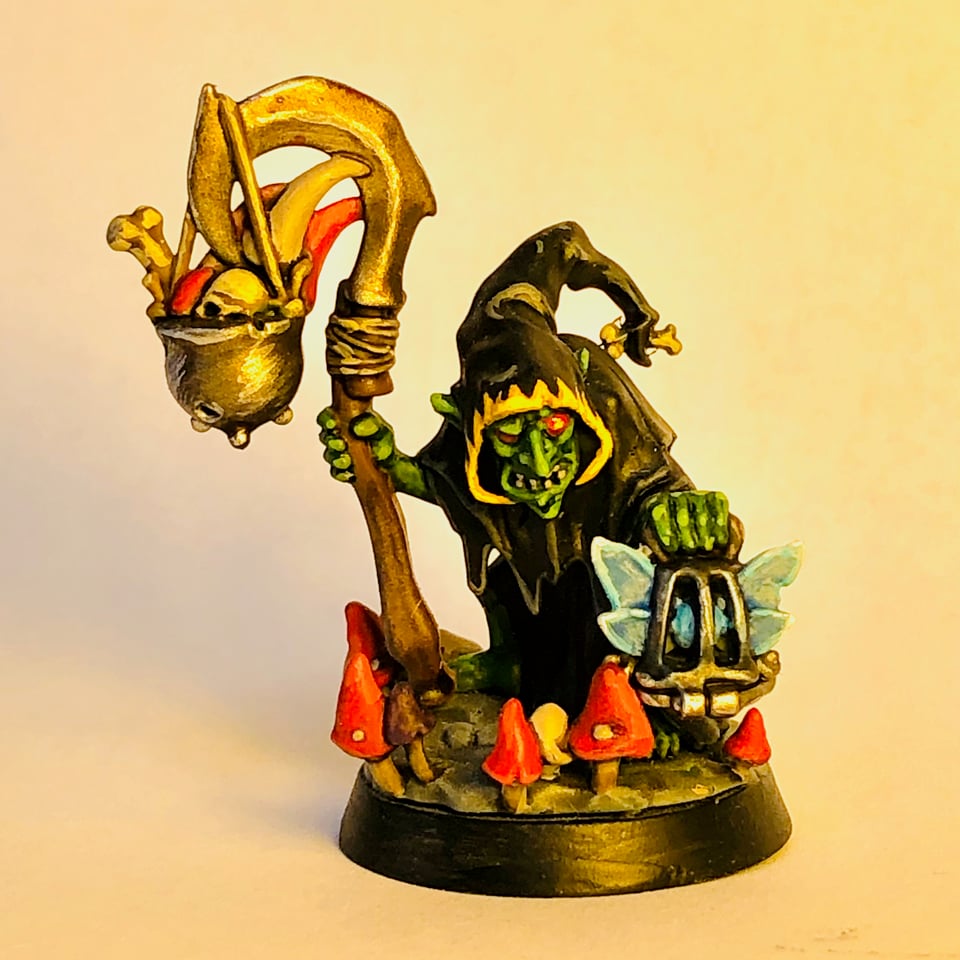
JR: That Covid-inspired transformation is becoming a familiar story in this industry, I can see, Could you tell us a bit about the Wyrd Science itself? What were and are the specific aims and dreams of the project? I remember my own time on print magazines being one where each volume was its own story. I assume that is true here?
JP: Yeah, so like I said originally it was just going to be a little zine. Around 2018 or 19 or so, when I was first thinking about it, there’d been a load of these great little small press folklore or occult or esoteric zines published. Weird Walk (which I have to say for the record as much as I love them I had come up with the name Wyrd Science before I bought my first copy of that), Hellebore, stuff like that.
I’d always loved magazines. I had loved writing for them but seeing this kind of zine revival was really inspirational and kind of what I wanted Wyrd Science to be overall. I figured we’d print up a couple of hundred, I’d sell a few and it would just be something to look back on, in much the same way I look back at the records I’ve released and generally lost lots of money on.
And for that first issue there wasn’t really a theme or anything, I just wanted to make something that might in some small way look a bit like a real magazine you might have found in a shop. I think the line I came up with back then which still stands today was: I wanted to create a magazine that treated Space Wizards and Gelatinous Cubes with the respect they deserve. I wanted to show how important games could be, show how they are as much a part of social history, especially British social history as punk or acid house, but also not lose sight of their wonderful, inherent ridiculousness.
Anyway we Kickstarted it in the autumn of 2020 and got like 300 backers or something, and to my eternal surprise by the start of 2021 I had something on my computer that actually seemed to resemble a real magazine. I printed up 500 thinking the spare 200 would be collecting dust for the next few years and they all sold within like 2 or 3 weeks. People genuinely seemed to love it! So, of course, I had to do another.
JR: The trap!
JP: Publishing today is weird. Like, if you’re trying to sell a few hundred thousand copies on the high street you’re fucked, but it’s genuinely a glorious time for beautiful little bespoke niche magazines. Don’t get me wrong: it’s a fucking hard time too, I write half the mag, I do all the graphic design layout, all the admin, social media, retail, distribution, everything and I’ve never paid myself a penny, in fact put in a fair amount of my own money but still I’ve managed to put together something that a few years ago would have been impossible or that someone like EMAP or Bauer would have spent £100K+ launching then cancelled after three issues.
But it is possible and because it’s just me, and the distance between losing money and actually making a proper grown up wage from all this isn’t that far apart. We printed 2500 copies of our second issue and they’re all gone! If we can do that issue after issue then it’s a real viable business, double that and I’m paying myself, and our writers and artists, a decent fee. Also I always wanted the magazine really to just be this central point that all kinds of other stuff revolved around. We’ve looked into doing book clubs, hiring a cinema for some screenings, game jams, all kinds of things like that. Hopefully in 2025 I’ll have a bit more time and some of that will start happening for real.
JR: That would be ideal. How are things looking right now?
JP: Well I’ve run up a lot of debt which I guess is something. Luckily I’ve kept a few clients on from my music days so when things get a bit hairy I dip out and work on an album or two and just funnel that money back into the mag. It does slow us down a lot but it keeps the lights on. Really I’m just glad to have showcased in some small part the amazing games out there, and definitely to have provided a space (and money) for some great writers and artists to showcase their talents. There’s increasingly less opportunities like that around. I just wish I had more money to funnel to more artists and writers. The thrill of seeing someone convert your terrible scribbles or half baked idea into a piece of art, or take a feature in a direction you hadn’t anticipated is intoxicating. On the downside if I’m honest there’s also a lot of days when I feel like really I’ve managed the square root of fuck all. We should be on about issue twelve by now and we’re just working on number seven. I feel like we should be selling a lot more and I feel like we’ve yet to convince the vast majority of games publishers (not to mention the millions of players) that a print magazine is something to enjoy and celebrate!
I often imagine that the very few who do even consider us at all would probably rather we were a YouTube channel or something. But honestly I will die (penniless) on this hill that magazines are one of the greatest vectors for information that we have, and that we are immeasurably culturally, socially and intellectually impoverished by their decline. Seriously, you start to talk about magazines to people of a certain age and they all get misty eyed and start talking about how they miss them and whatever. But people, come on, magazines are still out there: just buy one!
JR: We have to agree with this. [And you can, folks!]
JP: Anyway, Wyrd Science is fundamentally a work in progress and much as people have said some lovely things about it, to me it feels like we’ve managed about 10% of what I want from it. Certainly in design terms I want to make it much more visually exciting but also I really want to push the kinds of features we publish, I’m still 100% figuring out what being an editor means and I want us to take a lot more risks and, were we to make more money, do much more expansive features.
I see something like Quintin Smith’s amazing video essay on Jubensha and just think shit, the budget for that probably dwarfed what I can spend on an entire issue. Tabletop games are such a remarkable part of our lives and human society, going right back to when we lived in caves and with a bit more money there’s so much more we could do to properly showcase that.
At the same time, looking back at the last couple of issues I feel like it can be a bit heavy, we maybe erred a little too far into treating everything too seriously. My favourite magazines have always had quite an irreverent edge and I’m keen to bring a bit more of that into the mag.
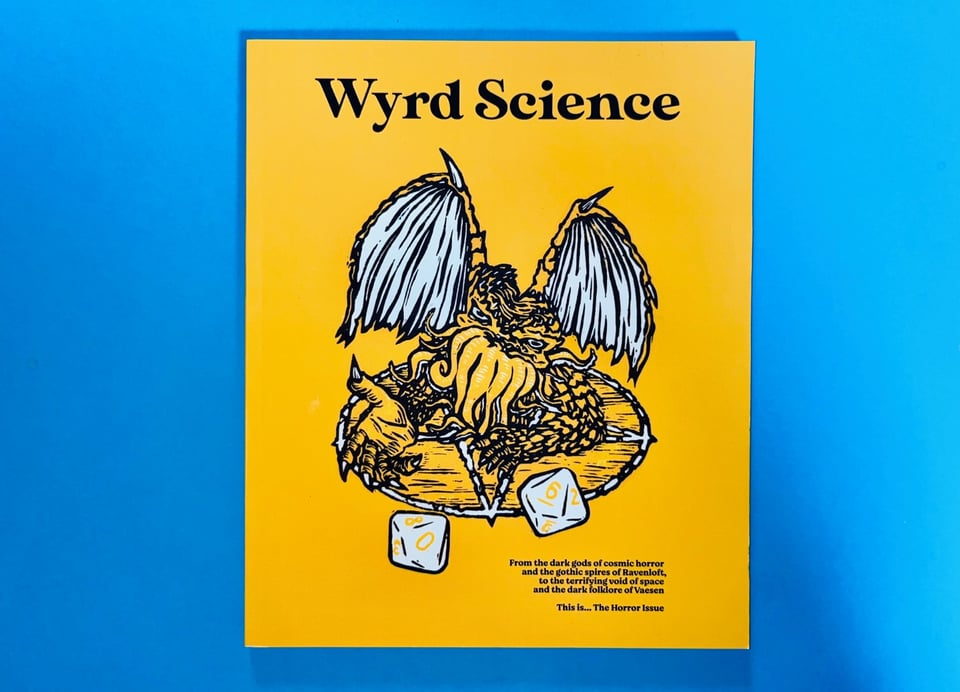
JR: Yes, although I’d say it definitely shouldn’t feel like having an irreverent sense of humour means you aren’t taking a subject seriously. One of the things I think Rock, Paper, Shotgun, and before that my tenure on PC Gamer did particularly well was be silly and funny while taking things extremely seriously indeed. Do you feel like you can share any other lessons from the project? What went well, what it taught you, and so forth? Are there some articles in there you particularly want to draw attention to?
JP: Oh god, I don’t know about what went well, but if I was to start listing everything that went wrong we really would be here all day. I always say at the start I planned for everything but success, so when it suddenly became bigger than I could handle myself I made some terrible decisions.
The first year or so really was a series of tragicomic disasters. We got royally screwed over by one of the warehouse and distribution hubs we used, our Facebook account got compromised and through our ad account we lost all the money we made on the first issue, we had to reprint at great expense a load of the second issue because a shipment got left on a runway in the US during a storm, paper and shipping costs seem to exponentially surge in between issues leaving us screwed when I hadn’t really thought far enough ahead, Brexit - fuck me - Brexit happened. It just goes on and on.
But then yes good stuff happened too, I found some lovely writers and artists to work with. That’s a lesson there, find people who make you look better than you are and hold on to them. The artists we’ve worked with, my god, Mat Pringle who does our covers, Lukasz Kowalczuk, Carly A-F and Flops who’ve done a lot of our interior art. Absolute treasures the lot of them.
Honestly I wish I had the money to get these people more involved in every level of the magazine. Doing most of this on your own is tiring but also kinda lonely. The one thing I do miss about when I was running a PR company was having a team of people to bounce ideas off and be challenged by, the magazine would be infinitely better if I could have even just one or two of the people we work with on staff.
I guess also I discovered I loved doing graphic design, I’ve always been interested but from a distance but it’s just such an incredible art, skill, or melange of the two. Whilst I’m still a rank amateur at it I do love teaching myself new skills and I think I’m gradually getting better and I feel like I can now start to break the occasional rule here and there.
What’s been really great is seeing this community build up around the magazine, and I wish we’d been able to do some live events and attend conferences and stuff like that to really develop that, but there’s loads of incredibly lovely people out there into games (and of course some absolute wronguns) and just doing a little bit to showcase this scene has been great. I think if I had to highlight a few articles we’ve published I’d have to pick Dan Thurot’s look at politics in board games, it was something I really wanted us to cover and Dan absolutely nailed it. Then Rob Weiland’s interview with April Kit Walsh about Thirsty Sword Lesbians, that just got over so much that excited me about the scene when I got back into it and then right back to the first issue, Willard Foxton Todd’s interview with Kieron Gillen, which ended up being about 10,000 words long, covered almost every subject imaginable and really felt like a statement of intent.
Oh and if you allow me to mention one of my own, then in the last issue I interviewed Dan Abnett about his Warhammer novels! Which personally was a real treat but also we were able to go from talking about Warhammer directly to Coleridge, Blake, psychogeography, all sorts without it ever feeling forced or like we were trying to shoehorn it in. I love using games as a kind of prism to look at life like that. Anyway that article isn’t online yet so you will have to buy issue 6 to read it.
Oh yeah, and finally one very important lesson I did learn from all this: If you do or rather did, own every one of those aforementioned 1980s/early 90s Games Workshop big box games, don’t leave them in your parents attic. Thirty years later you’ll both discover that they’re all now worth hundreds and that your mum dropped them off at a charity shop two weeks after you left home in 1996.
JR: I mourn my Dark Sun and Waterdeep AD&D sets every day. But more on the contributors and the editorial. How did you go about finding good material?
So I’ve been lucky in finding a small group of writers who absolutely know their shit, but that’s been surprisingly tough. I want Wyrd Science to be filled with good writing and that just doesn’t have that much of a history in our little corner of the universe. I could start a music mag and there’d be a huge pool of people who just have that kind of cultural muscle memory of what writing about music can be.
There’s a kind of canon there - Bangs, Kent, Morley, etc. You can be inspired by them, imitate them or reject them and develop a style in opposition but they’re there. Same with film, or food, or even video games, but we just don’t have that to the same degree in tabletop games. And of course there’s just little to no places for people to build up that experience of writing about this stuff, and especially for print which really can be incredibly different to writing online, in ways that a lot of people don’t really get.
And even more of course if you are into tabletop games and you have OPINIONS then to be honest you’re more likely than not going to focus on building up some kind of personal brand on YouTube or TikTok or something. Pivot to video may have been a grotesque scam perpetrated upon us by Zuckerberg and his ghoulish minions but there’s no denying that we live in a video age now.
But for all that we’ve got some great writers. Someone like Dan Thurot is probably the best writer on boardgames out there right now, Rob [Wieland], Samantha Nelson, these are people with years of knowledge and experience in RPGs and a pleasure to work with. Then you have someone like Mira Manga who can always pick me up when I have my roughly once a week, “this is all too hard and I’m an idiot for even trying to do this” moment.
And my inbox is always open. Probably 95% of everything we’ve published has been something I’ve thought would make a good story, or something that needs to be covered, and then where possible paired that with a writer. But I’d love more people to hit me up and pitch their own ideas.
And my god the same thing goes for publishers, I cannot overemphasise just how much of a pain it’s been even just to get people to send us a press release. I don’t think I’ve written anything of any significance in a music magazine for about six years now but I still get like 10 albums a week sent to me and countless pitches for all kinds of stuff.
JR: Are you getting to play much yourself? If so, what's on the table?
JP: Board games probably get the most table time here as it’s easier to rope people, my wife especially, into playing them. The Undaunted series, those are stellar and I’m currently putting the latest, sci-fi, version of that through its paces.
In terms of RPGs they’re quite trad but I think Vaesen and Dragonbane are the two that I really want to get a regular game of together at some point soon. I love them when I do get to play them and they both tick all my boxes really. I’ve got some ideas for my own scenarios for both of those that will maybe make an appearance next year.
Wargames, well it feels like I just mainly spend time staring at the boxes upon boxes of unbuilt citadel miniatures, but actually no I have over the past year or so I’ve started playing a lot more of these super fun, little weird indie skirmish games, kind of miniature agnostic, very narrative heavy, and very often with solo modes. Those are definitely my jam right now, stuff like Deth Wizards and Majestic 13 from Snarling Badger are great fun.
Solo/co-op wargames are really starting to do some interesting stuff, but especially when you look at recent solo RPGs you see there’s still loads of room for innovation there.
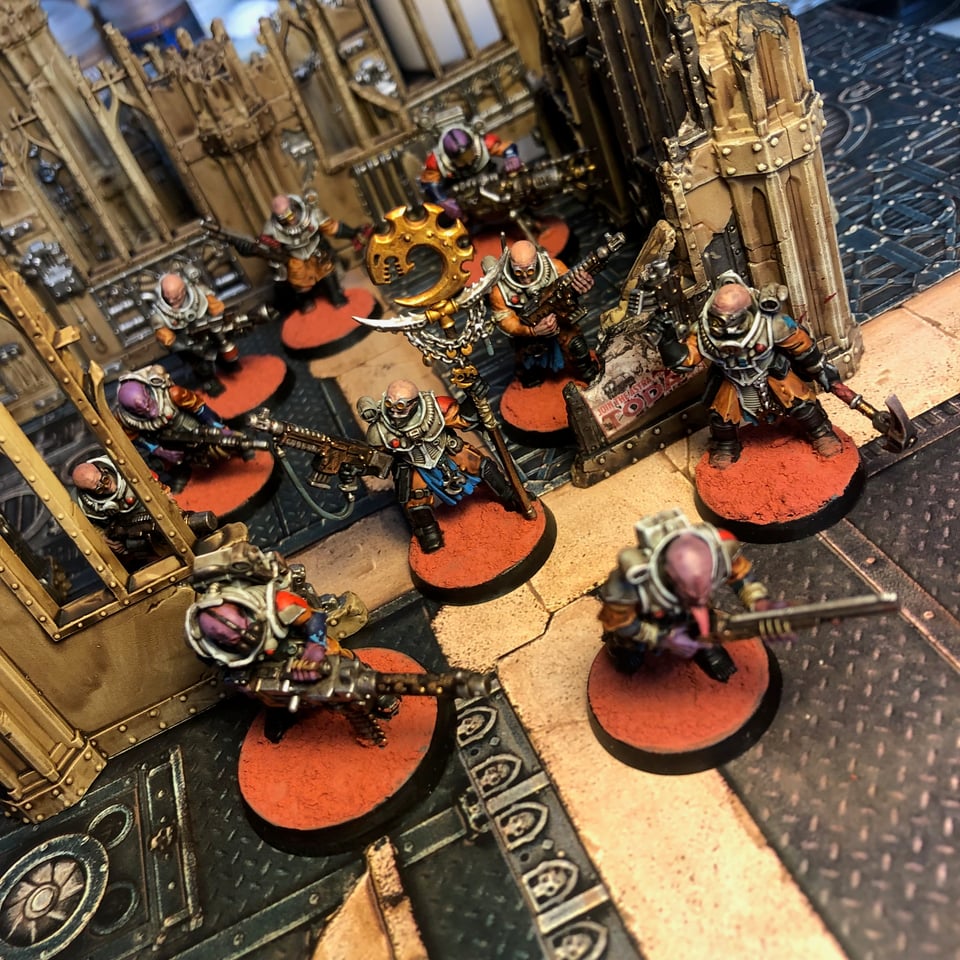
JR: More broadly, what are you excited about in the TTRPG space? Do you see any trends that particularly interest or excite you in the overall mass of things now being made?
JP: Honestly, a lot, after six years I’m still in awe at the creativity out there. Obviously the brutal market hegemony of Wizards of the Coast and Games Workshop is a major blockage but as I was saying in regards to wargames, in some way their dominance means that after decades of these kind of tabletop games there’s still so many places for them to go.
For example, I’ve been thinking for ages about how to take direct violence out of wargames, which sounds a bit odd I guess but especially with solo games and stuff like that, what about games where you play medics or civilians caught up in someone else’s shit and you can use them to explore themes beyond just bang! Kill ‘em all. Wargames are starting to go through a phase like RPGs had a few years ago and I’m really hopeful that some wild shit that takes them in completely new directions emerges.
We’ve had fifty years of games that riff on the same things that DnD & Warhammer have riffed on, and long may that continue as there’ll always be a market for that here with me, but I love seeing stuff that I just wouldn’t have thought about start to appear, something like Jude’s World, a solo journaling game about being a teenage girl whose parents are going through a divorce. Now am I the target audience for that? Probably not, but that’s good. I’m genuinely so happy to see stuff like this coming through that will appeal and mean something to people who for years haven’t had that in this space.
JR: And beyond RPGs what should our readers be looking at? (Please take some time to recommend things you want people to see, in magazine publishing or any other area!)
JP: Oh god, so I’m an insatiable cultural magpie, just constantly on the hunt to scavenge interesting looking stuff and hoard it away in my nest. Hmmmm… let’s see what I’ve recently been enjoying.
Book wise I’m just about to finish Rob Young’s The Magic Box, a brilliant book looking at post-War Britain through the TV screen. From folk horror films to Doctor Who and onto the likes of Bagpuss and beyond. It’s a big book and filled to the brim with new (old) stuff that you immediately want to go and check out, it’s exhaustive if sometimes exhausting you might say but well worth ploughing through.
I’m also really enjoying Ed Gillet’s Party Lines, it’s a look at the history of British clubbing and club music and how it’s always stood in opposition to authority and mainstream culture and yet ultimately shaped it. As someone that got to enjoy the last gasps of the free party techno scene before the Criminal Justice Bill it’s been a great read.
Music, god as your readers will have picked up by now I could go on for a while here. This summer’s big LP for me was Fatoumata Diawara’s London Ko. It actually came out last year but I rediscovered it at the start of June and it rarely left my record player since. Just stunning modern Malian music, if people want to check one thing then the Colors performance she did of the song Nterini is simply just sublime.
I am woefully behind on films and TV, there’s just so much out there that comes at us so fast and then is cancelled before you know it, it’s hard to know where to start. Probably my favourite thing I’ve watched was a series on, I think, Apple TV called 1971. It’s this 6 or 8 part music documentary that focuses in on that year and makes the case it was this incredibly pivotal moment in music and culture. Anyway it’s brilliant, the episode which features the Attica Prison riot is one of the most jaw dropping things I’ve seen in ages, definitely check that out.
Magazines, like I said about an hour ago, right now it’s a golden age. If your readers do one thing after reading this I hope it’s buy a copy of Wyrd Science, but if they do two things then well buy another magazine, go to a shop like Rare Mags and just grab something random. Looking at what I’ve bought over the last few weeks we’ve got Mundial (football), Pressing Matters (printing), Little White Lies (films), Batard (dogs), Sandwich (food), Like The Wind (running), and well I could go on, there’s just so much amazing stuff out there.
Oh yeah, and of course shout out to Senet too, they launched just before us, are totally focused on board games and they’re on about issue 13 now. It’s a beautiful magazine, made by people who both love board games and more importantly have much more of a fucking Scooby about putting together a magazine that, I suspect, actually makes money!
JR: Thanks for your time.
--
More soon! x
Add a comment: